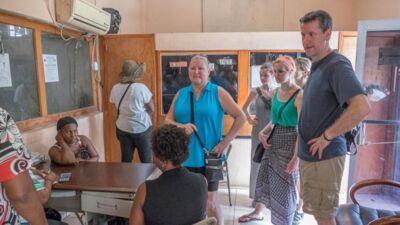Studying Human Behavior with a Behavioral Science Major

Human behavior, whether on an individual or group basis, frequently fascinates students. Many wonder about questions like: “Why do we form social groups?” or “why do some people commit crimes?” Answering these questions – or even just pondering them – takes a unique sort of scholarship and mental effort. For behavioral science (also known as sociology) students, these questions are the ones they bring to, and study in, class. Furthermore, they can have important applications to a wide array of careers – so for students who want to ask, think about, and address them, choosing the behavioral science major at Concordia University, Nebraska can be a straightforward choice.
Courses with titles from “cultural anthropology” and “social problems” to “the family” and “urban sociology” inform students that the behavioral science major is a broad, wide-ranging program of study that can apply to many careers and post-graduation paths. It’s also a major that not only guides its students in developing workforce-specific skills but teaches them to apply their knowledge and skills to tangible, real-world problems.
Therefore, whether your interests lie in how poverty can impact mental health outcomes or the practice of effective intercultural communication, sociology courses could bolster your college education. In essence, this is why the behavioral science major or minor can help you thrive in a variety of careers.
One of the most significant areas that overlaps with sociology is psychology. As a student double majoring in psychology and behavioral science, you’ll take classes in the specifics of brain function, development and individual social interaction while also studying the large-scale impacts of these processes on social issues, dynamics and culture. After college, you might become a mental health therapist, psychologist or school counselor.
Alternately, you may choose a behavioral science major as an addition to another field, like business, education or healthcare. Each of these fields requires significant interaction with other people, whether in groups or individually. A firm understanding of human interaction and behavior will be an asset in any position involving lots of it. Pre-health programs in particular, like pre-occupational therapy, physical therapy or nursing, are especially conducive to adding a behavioral science major, as they are programs of courses instead of independent majors.
Finally, at Concordia, the behavioral science major serves as the basic core curriculum for the pre-social work program. Like a pre-health program, pre-social work students must choose a major in addition to the program of which they’re part. Behavioral science is, very often, the major selected by these students. Social workers are employed in many settings, choose from various specialties, and serve populations from infants to the elderly. With a bachelor’s degree in behavioral science as part of the pre-social work program, students will be well on their way toward an entry-level social work job or a Master of Social Work (MSW) degree.
A major in behavioral science is educational, rewarding and often fun. With opportunities for internships, hands-on learning and volunteering built into college experience, the program will set students up for success in a myriad of career fields. Whether you wish to become a social worker, psychologist, nurse, or one of many other employed professionals, behavioral science is a great place to learn more about the human experience as it’s relevant to your career goals.
The behavioral science major at Concordia Nebraska is designed to educate students in a broad manner about society, social interaction and culture in a way that prepares them to interact with others in their everyday lives. No matter your goals for a career in the social sciences, behavioral science will provide you with a holistic perspective on real-life issues that you and the people with whom you work may face. Learn more about Concordia’s behavioral science program here.
Related Stories


